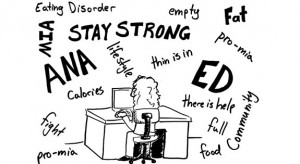In October 2001, The Oprah Winfrey Show gave viewers an inside look into a dangerous Internet world of pro-Anorexia and pro-Bulimia communities. Eleven years later, the pro-Ana ghost has reappeared, and sites like Pinterest are taking a stand on content that promotes self-harm.

Pro-Ana and Pro-Mia content uses the terms Ana, Mia, and ED, meaning eating disorder, to represent them as lifestyle choices, not disorders. Once restricted to early websites with little user interaction, like Angelfire, the idea has spread to social media.
Reading this content is like peeking through the pages of a stranger’s diary. The writers are struggling with body image issues, eating disorders and problems in their social lives. The arguments for why sites like Pinterest should ban such content are solid. The posts are disturbing and could trigger a relapse for those who have recovered from an eating disorder. Content ranges from photos of unhealthily thin women to tweets of mantras like “the best anorexic is a dead anorexic.”
However, to ban content related to pro-ED and similar terms would be to ignore a group of people who find community in this online world. The users’ motivations cannot be boiled down simply to pursuing beauty; they are consumed by a serious disorder that carries with it the highest death toll among all mental illnesses. Often, people posting are not trying to lose a few pounds; they’re fighting an eating disorder.
Banning content hasn’t worked in the past. After the Oprah episode aired in 2001, the National Association of Anorexia Nervosa and Associated Disorders began a campaign that convinced Yahoo!, Angelfire and other free Internet services and search engines to ban pro-ED pages from their search results and websites. But this didn’t get rid of Pro-ED content; users just turned to other sites, then social media.
Moderators of sites like Pinterest should recognize that those posting self-harm content are anonymous, so it’s likely their friends and family are unaware of their suffering. Rather than shut out these people, the sites should track certain words attached to posts and offer an informational page as a positive recovery alternative to engaging in a pro-ED lifestyle community.
As users browse the pro-ED world, they see links to related content. Those additions, often placed strategically to relate to the topic the person is reading about, would be an excellent place for rehab clinic, psychologist and chat line ads. As a user searches for pro-ED content, they’ll also see a link for a pro-recovery website. By being presented with positive resources, they may consider the better alternative.







